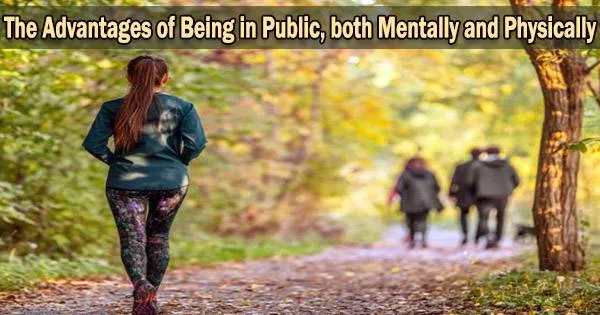Spending time in public can have a number of mental and physical benefits. Here are a few:
- Improved mental health: Being in public and interacting with others can help reduce feelings of loneliness and isolation, which can be beneficial for mental health.
- Increased physical activity: Being in public may encourage you to walk or engage in other forms of physical activity, which can help improve your physical health.
- Enhanced social connections: Spending time in public can allow you to meet new people and make new connections, which can be beneficial for your social well-being.
- Increased mental stimulation: Being in a public setting can expose you to new ideas and experiences, which can help keep your mind active and engaged.
- Improved overall well-being: The combination of the mental and physical benefits of being in public can lead to an overall improvement in your well-being.
Many people have delivered the well-worn advice to “just get out there” to someone who is shy, new in town, or on the rebound romantically. We occasionally provide this advise to someone who is depressed or lonely, always with the greatest of intentions.
The emphasis is on forging relationships, whether it is in the context of meeting new friends or a romantic interest. However, research suggests that being in public could have even another advantage.
The Satisfaction of Socializing With Strangers
Julianne Holt-Lunstad and Andrew Steptoe (2022) examined the link between social isolation and physical health. They start by acknowledging the well-known link between health and social interaction, noting that a lot of the research in this area focuses on loneliness. However, they make a point of pointing out that data suggests that even the mere fact of others’ presence in the form of regular contact and proximity is a crucial element of health and well-being.
Humans are a social creature, and Holt-Lunstad and Steptoe point out that social interaction and being among other people are essential for human growth, reproduction, health, and, ultimately, survival.
Using an analogy from the animal kingdom, from which we have experimental evidence of the impact of social isolation, they report that animals housed in isolation are at a higher degree of risk for numerous adverse outcomes, including recovery from a stroke and death.
Holt-Lunstad and Steptoe opine that research might have placed less emphasis on social isolation because it is often viewed as more complicated, and harder to change. They point out that therapies that change social contact in terms of frequency and participation may be a more practical alternative because characteristics like living alone and marital status may be challenging to change. They claim that social group intervention programs have a favorable effect on social connection, mental health, and the capacity to handle mild to moderate depression.
Although Holt-Lunstad and Steptoe recognize the existence is mixed, and group-based interventions may be best tailored to accommodate individual needs, it appears that social exposure is beneficial for many people, both mentally and physically.
Social Engagement: Seeking Safety in Numbers
Other research investigated how the importance of social engagement is perceived differently by extraverts versus introverts. Studying emotional responses during the pandemic, Indy Wijngaards et al. (2020) examined the impact of COVID-19 protective measures on depression.
Based on survey data from 93,125 respondents collected between March 20 and April 6, 2020, across 47 countries, they found that, for introverts, strict rules had a negative effect on depressive symptoms, while, for extraverts, the effect was positive, although nonsignificant. Their findings imply that while social constraints may generally help people worry less and feel safer, introverts are more likely to describe the related lifestyle as “natural” than extraverts.
The findings of Wijngaards et al. validate previous research observing that the lifestyle involving social distancing would feel more unnatural to extraverts (as opposed to introverts) because it inhibits the extravert’s desire to satisfy their strong desire for social engagement.
However, they also point out that psychological studies generally show extraverts to be happier and less prone to mental illnesses like sadness and anxiety compared to introverts.
Quantity Over Quality
There will always be individuals who report feeling alone, even in a crowd. However, for many others, participating in the chaos of daily life with people and being out in the open can enhance emotions of both mental and physical well-being.
















